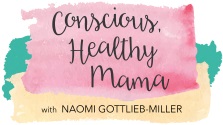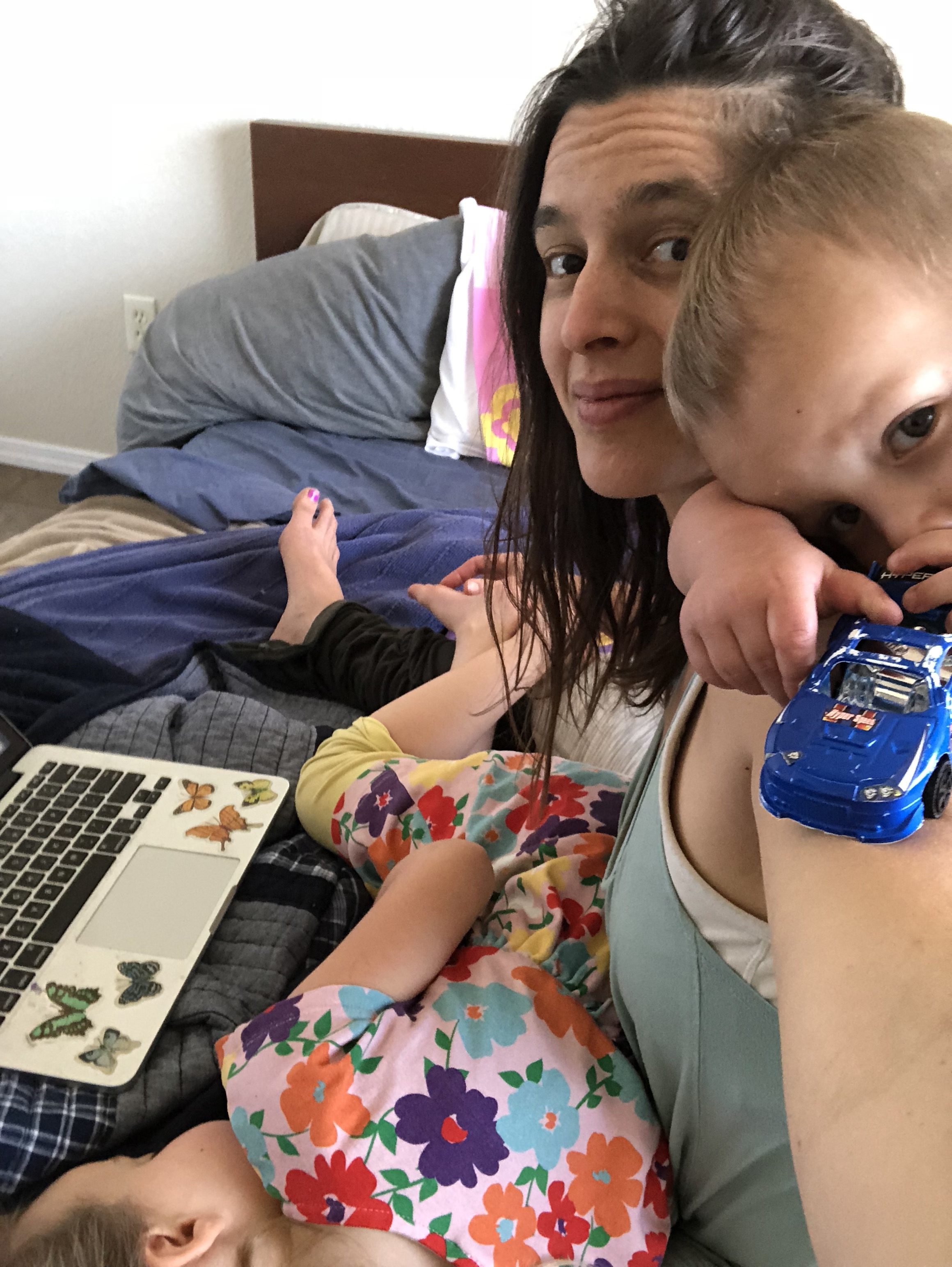It’s 9:15pm.
I hear rustling and vague crying coming from my son’s room.
He doesn’t actually sound like he’s awake.
I hold my breath and try not to move a muscle while I wait to hear if he’s really awake or just wiggling in his sleep.
A few more seconds pass.
Basically, an eternity.
I am sweating.
A few more seconds pass with no more sounds from his room other than breathing.
I exhale.
Then he cries.
A feeling of dread creeps in.
I don’t want to change another diaper. I don’t want to rock him to sleep again in a dark room.
I love my son.
But it’s late. I just want to get into my pjs, curl up with a book, and cuddle with my hot husband. I want to relax and go to bed.
It’s been a long day complete with a semi-sick kid, my 5 year old daughter, who needed to nap intermittently throughout the day on my bed, sometimes even in my lap as I tried to update my website.
Mama needs some personal space and some alone time.
I mean what mom doesn’t, right?
I adore my kids.
I love being a mom.
And sometimes, I’d rather take care of myself than take care of them. Is that so terrible?
The truth is that we tell ourselves that it is terrible. And sometimes other people tell us it’s terrible. Before our kids are even born, we’re made to understand that our kids should be our number one priority and our own needs come last.
It’s part of the postpartum-martyr-mommy-bounceback-quickly combo package. It’s downloaded directly into our brains the moment we give birth or bring our children home.
Moms get lots of advice on how to exist postpartum.
“Get your pre-baby body back,” shout the Instagram fitness coaches.
“Fit into your pre-pregnancy jeans again,” scream the headlines from every single women’s health magazine.
“Feel sexy again after baby,” suggests Cosmo and her friends.
“Your body will go back to normal within minutes of giving birth,” says every single Hollywood movie ever.
And so we feel this enormous pressure to not only bounce back, but to look even better after giving birth. It’s ridiculous and destructive.
What’s even more ridiculous and destructive is that the culture we live in values postpartum weight-loss and physical appearance over postpartum mental and emotional health.
Meaning, you might have lost all of the baby weight and you look awesome, but you still feel like shit.
There’s so much to juggle mentally and emotionally when you’re a mom that it’s easy to start bypassing your own needs when they come up.
We feel immense pressure to do #allthethings, while keeping our kids healthy and reasonably well-adjusted. Not to mention most of us haven’t had consistently uninterrupted sleep in years.
Add to that the fact that the busier we are (and almost every mom I know would describe herself as “busy”) the more isolated we become from our friends – our sanity saving support systems – so we pour ourselves into mothering or working or both.
We feel guilty for feeding our kids candy or for letting the TV babysit them while we try to get work done or for just taking a shower by ourselves.
Our stress levels are rising but instead of taking care of ourselves or reaching out for support, we isolate further and get lost in the daily maze of motherhood.
Mommy burnout is a real thing.
I just read a book about it, but honestly, I didn’t need to read a book about mommy burnout to know that it’s real because I’ve lived it and witnessed it in almost all of the moms I know.
Mommy burnout isn’t just for new moms. It can fester and grow and mutate within us through the time our newborn babies become teenagers.
Mommy burnout makes for some hilarious comedy, mostly because it feels so real, but the truth is so much darker. Mommy burnout can impact your mental and physical health, as well as your relationships with your partner, your kids, your family, and your friends. Mommy burnout can influence your outlook and your emotional state.
Until we start recognizing the humongous strain that raising tiny humans can be, moms are going to keep suffering, mostly in silence.
There are a lot of things you can do to alleviate mommy burnout. Most of it you’ve probably heard before. It’s the “doing it” that’s difficult.
Here are my top 5 ways to combat Mommy Burnout:
- Acknowledge that your needs matter.
And then, choose to actually listen to your needs when they come up and tend to them. Sometimes this is impractical (“I need to get out of here and sleep for 2 days straight”) but other times we bypass completely legit, necessary things for no good reason (“I need to pee”)
First step is to acknowledge your needs. And then begin to listen to them.
- Stop suffering in silence.
We mamas have a tendency to bottle things up. We’re afraid to spill the beans of the craziness of our lives. When in reality, we’re all going through our own versions of crazy. Stop suffering in silence. Talk about your stresses. Share your experiences. Don’t hide behind mommy burnout. The more you talk about it, the less of a “dirty, dark” secret it is. And when it’s out in the open, you can actually start to deal with some of the crazy.
If you’re not a mom, but you know a mom, don’t let her suffer in silence either. Reach out. Talk to her. Share your own challexperiences
- Reach out and connect.
This goes along with number 2 in that once you’re out of hiding, having a support system is crucial. Motherhood can be very isolating, but it really shouldn’t be. First, we are stronger together. Second, when we’re stuck in the ruts of motherhood we get cutoff from the relationships that can help keep us sane. Yes, making new friends can be awkward as an adult. Reconnecting with an old friend you haven’t really spoken with in awhile can be equally awkward. Still, the rewards are great.
- Stop using social media as a yardstick for measuring healthy motherhood.
Pinterest is not real life. Neither is instagram, for the most part. Yes, there are people who share the full spectrum of their experience, but even then, it’s still slightly edited or shared in an intentional way. You’re not living that mom’s life. You have no idea what her real experience is. Stop comparing yourself to the tiny squares of someone else’s life that they are choosing to share. It’s not healthy. It’s not realistic. It’s not fair.
- Don’t be afraid to ask for help.
I feel like this is the hardest one. At least for me. I am a super control freak. And I like to be able to say I handled it all myself. Except that this kind of behavior is silly and draining and crazy making, a lot of the time.
Get a babysitter. Ask a friend for advice. Ask your partner to do the dishes/laundry/go grocery shopping/take the kids to the playground without you. The cool thing is that people WANT to help. We’re just too proud or too embarrassed or to whatever to ask.
Stop that shit.
Ask for help.



